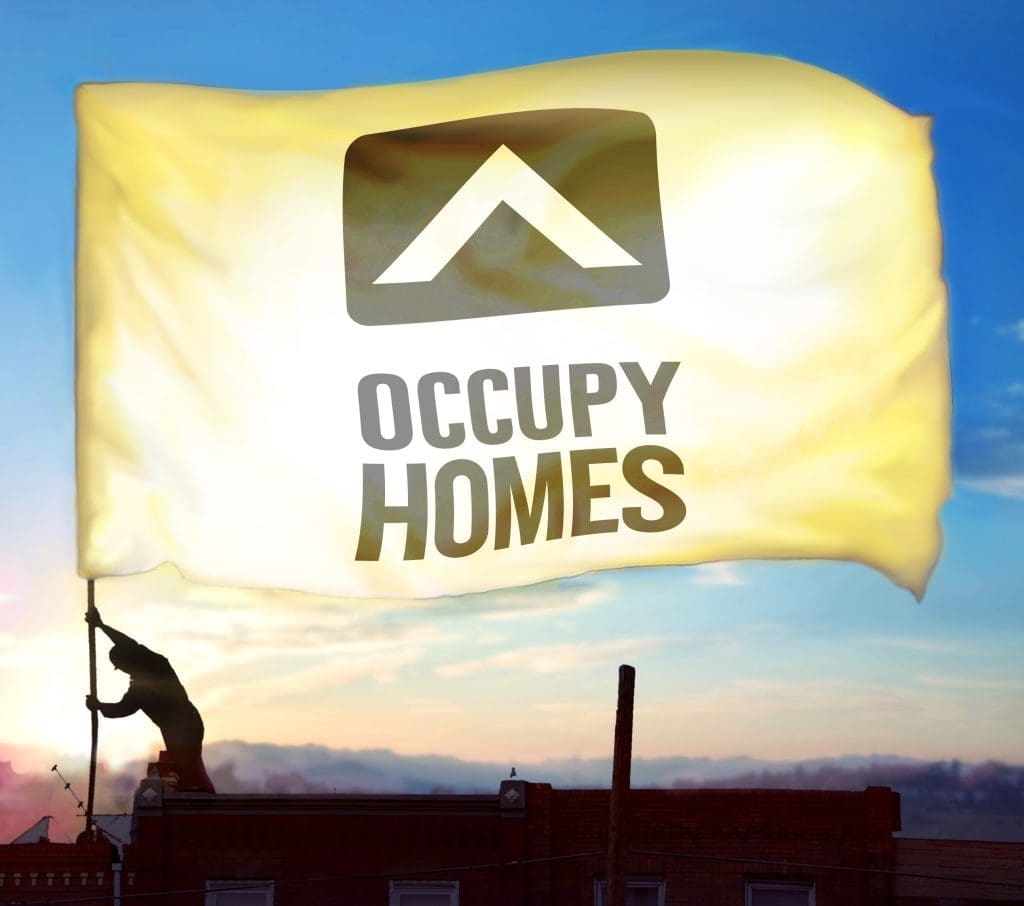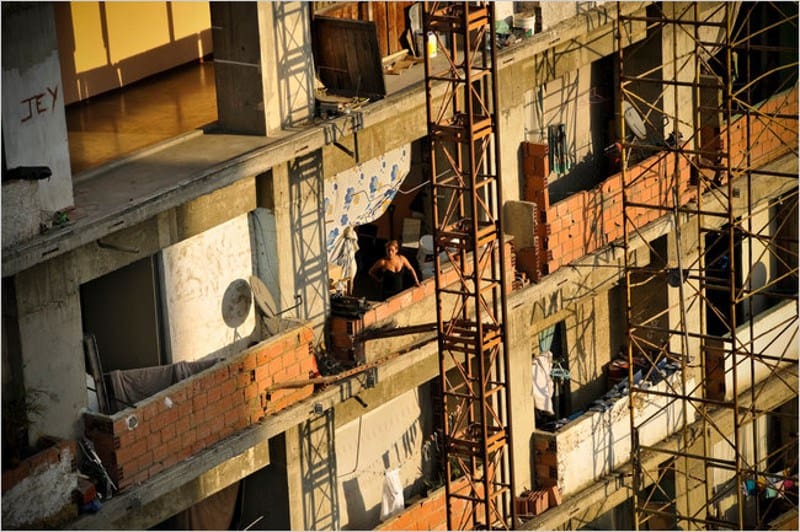AntiNote: The following is an extended excerpt of a radio interview, edited for readability.
On 7 December 2013, Chuck Mertz of This is Hell! Radio (Chicago) interviewed Laura Gottesdiener about her recent TomDispatch piece on housing justice and an emerging ‘rent bubble’ in the U.S. economy. We find that Gottesdiener’s examination of the issue dovetails nicely with conversations we have been having on Antidote about the need for housing justice mobilization and property resistance, an essential spoke in the revolutionary wheel.

We’re going to be paying our rental checks to financial institutions that collude with the big banks that orchestrated a foreclosure crisis that pushed us out of our homes and tore apart our communities in the first place.
Chuck Mertz: Our first guest on this morning’s show is Laura Gottesdiener. She is a journalist and the author of A Dream Foreclosed: Black America and the Fight for a Place to Call Home, published in August by Zuccotti Park Press. She is an editor for Waging Non-Violence and has written for Rolling Stone, Ms., Playboy, the Huffungton Post and other publications. She lived and worked in the People’s Kitchen during the occupation of Zuccotti Park. Her most recent writing is the TomDispatch piece from last week: The Empire Strikes Back: How Wall Street Has Turned Housing into a Dangerous Get-Rich-Quick Scheme—Again. Good morning Laura.
Laura Gottesdiener: Good morning, thanks for having me.
CM: So let’s get into your article at TomDispatch. This week the economist Nouriel Roubini announced that he believes 17 countries may be in a housing bubble right now. The United States is not one of those countries. Why would you say a housing bubble is happening in the U.S. and why do you think Roubini might be getting it wrong?
LG: There was an incredible amount of press and economic fear around a ‘housing bubble’ in the last six months. It really hit a fever pitch about four months ago; since then the fears have somewhat diminished. But it’s important not just to say, “housing values are rising, and they’re rising quickly, therefore we might be in a bubble.” It’s more important to ask, “What is pushing these prices up, and, whether or not we’re in a ‘bubble,’ is this how we want the market to be driven?”
Are these positive incentives that are going to lead to more just, sustainable, and equal housing for everyone, or are these perverse incentives where people are making money off of something that everybody needs—right now, something that lots of people particularly need because they just went through one of the worst housing crises this country has ever seen.
I took a look at who was actually driving these purchases. When home prices go up, it’s a supply and demand thing: it means more people are purchasing homes, and values go up. But what the basic supply-and-demand calculation fails to see, if you do sloppy reporting on this, is that it’s not everyday people, first-time home-buyers, that are pushing up prices.
What we’re seeing instead is that a lot of hedge funds and private equity firms and financial folks on Wall Street are getting into the business of purchasing foreclosed single-family homes across the country, particularly in places that were hardest hit by the crisis. These institutional Wall Street purchases are driving up prices and boxing individual families out of the market. And what they’re planning to do with these homes is incredibly troubling and it signals that we’re going in exactly the wrong direction in terms of housing in this country.
Wall Street vultures are swooping in, executing a massive land-grab, buying up 200,000 foreclosed homes across the country, spending more than $20 billion.
CM: You write, “Wall Street’s foreclosure crisis, which began in late 2007 and forced more than 10 million people from their homes, has created a paradoxical problem. Millions of evicted Americans need a safe place to live, even as millions of vacant bank-owned houses are blighting neighborhoods and spurring a rise in crime. Lucky for us, Wall Street has devised a solution. It’s going to rent those foreclosed houses back to us. In the process it has devised a new form of securitization that could cause the whole plan to blow up again.”
So will our ‘new normal,’ then, be one not of the ownership society that President George W. Bush was pushing during the housing bubble but a tenant society where fewer and fewer Americans will own homes? And what’s so wrong with renting rather than owning? You don’t have to take care of the upkeep, and aren’t rents lower than mortgages?
LG: First off I want to say there’s nothing wrong with renting. We have demonized renting throughout the history of this country as part of this overarching narrative to push homeownership, which made a lot of money for industry and made a lot of sense for massively powerful lobbies including oil, timber, and auto manufacturers who pushed the suburbs. So there’s nothing wrong with renting. When people demonize renting it’s really a classist and often a racist analysis.
The problem is that we are going to become tenants of Wall Street. We’re going to be paying our rental checks to financial institutions that collude and work with the big banks that orchestrated a foreclosure crisis that pushed us out of our homes, destroyed our families’ wealth and tore apart our communities in the first place.
And now, because of our own housing vulnerability, Wall Street has swooped in to create a rental empire. It’s incredibly troubling to think that Wall Street would both control the mortgage market in this country by marketing mortgage-backed securities and control the rental market in this country by owning rental properties, renting them back out to us, and then securitizing our rental payments into risky financial products.
So it’s not an issue, necessarily, of homeownership versus renting. The question is, are we moving towards a housing policy for this country that values housing as a human right, are we organizing the society such that we all have a home to live in? Or are we moving further into a financialized and commodified version of the housing market where Wall Street is getting very rich on risky financial products but we are increasingly vulnerable to eviction, to displacement, to being mistreated by our management company, and our human right to housing is being swept aside in the pursuit of short term profit?

So that’s my concern—you see Wall Street vultures swooping in, executing a massive land-grab, buying up 200,000 foreclosed homes across the country, spending more than $20 billion to purchase these homes very quickly and at a moment when ordinary Americans have lost a staggering amount of wealth so that we can’t really purchase anything. And now they’re developing new risky financial products to make even more money off of renting these out to us. That’s obviously moving towards a housing policy that is not organized around our human right to housing. It’s organized around Wall Street’s short-term profits.
CM: Can we blame the Obama Administration or the U.S. Senate or the Congress? Can we blame politicians for this? Or is the issue that to reform the system, the problem has to happen first? That reforms in Washington are a reactive process and not a preventive process, because they simply don’t know what scam Wall Street is going to pull on them next?
LG: Everyone knew this was going to happen. I have to say that out loud. It started being formulated more than three years ago, as I was reporting for my book, which I published in August and spent two years reporting on. All the housing activists could see it happening, knew it was happening. It’s an obvious economic scheme, an obvious ploy for financial institutions right now. It’s classic Shock Doctrine, Naomi Klein’s theory that when there is a crisis, those in power will exploit the crisis to further privatize and further seize control over the assets and needs of a community. This was not something that no one could see coming. If you look at Wall Street and the way it operates, you could predict that this would happen.
And they were very vocal about it. It’s been all over the financial news for two years now. The new rental-backed security that the Blackstone Group issued last month: people have been writing about that for six months now.
So I think it’s completely unfair to say Washington could never have known what type of shenanigans they would be up to next. This is an obvious outgrowth of an increasingly financialized system that is taking advantage of housing, commodifying and financializing housing. Whether or not we can hold the Obama Administration culpable, I think it’s quite obvious that the Administration completely bungled its approach to dealing with ordinary Americans going through the housing crisis.
If Blackstone and these other Wall Street folks are supposed to be good at anything, it’s extracting money from our communities. So the fact that they can’t even process our rental payments is very troubling.
The Obama Administration has done an absolutely terrible job of advocating for ordinary Americans, whether or not they are homeowners. They haven’t really acknowledged that it is increasingly difficult, unstable and dangerous to live in this country, in this housing market. They haven’t asked, “what can we do for ordinary Americans to fix it?” Obviously criminal prosecution would have done an incredible amount to signal to Wall Street that they can’t govern these financial institutions in a way that the only objective is to create short-term profit whether or not they are trampling all over a host of laws.
We didn’t see that prosecution, we haven’t seen real relief for homeowners, we didn’t see a moratorium [on foreclosures]. The only thing that the Obama Administration has done recently is oppose cities in Michigan and California who want to use eminent domain to seize underwater mortgages and write them down to try to keep people in their homes. The only thing the federal government has done is say, “No, please don’t do that. Please don’t help ordinary homeowners, it’s really going to piss the banks off.”
So Washington has been a pretty huge mess over the last six years when it comes to housing, and it’s vastly irresponsible for Obama to go to Phoenix as he did in August, to trumpet rising home prices as this panacea for ordinary Americans and housing, and not honestly to say, “what we’re actually seeing is a housing recovery for the market. What we’re not seeing is an improvement in housing or in the lives of many, many millions of ordinary Americans.” So he’s feeding into this irresponsible and inaccurate narrative.
CM: As for the securitization and bundling of rents, just like they did with mortgages, you write, “According to interviews with economists, industry insiders, and housing activists, people are more or less holding their collective breath, hoping that what looks like a duck, swims like a duck, and quacks like a duck won’t crash the economy the same way the last flock of ducks did.”
Then you quote economist Dean Baker saying recently, “You kind of just hope they know what they’re doing, that they have provisions for turnover and vacancy, but have they done that? Have they taken the appropriate care? I certainly wouldn’t count on it.”
You write, “There’s one significant way, however, in which this kind of security differs from its mortgage-backed counterpart. When banks repossess mortgaged homes as collateral, there is at least the assumption (often incorrect due to botched or falsified paperwork from the banks) that the homeowner has, indeed, defaulted on her mortgage. In this case, however, if a single home-rental bond blows up, thousands of families could be evicted, whether or not they ever missed a single rental payment.”
I would think that for a group like Blackstone, the idea would be to make sure to keep the renter in the unit as long as possible. So is Blackstone being a good-faith landlord? Are they doing a good job at keeping people in their homes so they can keep that money coming in? Or are they dropping the ball again, just like they did during the housing crisis?
LG: According to reports from tenants of these homes that are just starting to come out, Blackstone hasn’t been a good management company. None of them have really proven to be good management companies. That’s not to say there aren’t individual cases of people being perfectly happy with their Blackstone-owned homes, but lots of people have not been. Lots of people have reported that the company is disorganized, that its management is spotty, that it’s difficult to get maintenance and repairs, that even their ability to collect rent is sometimes flawed.

If Blackstone and these other Wall Street folks are supposed to be good at anything it’s extracting money from our communities. So the fact that they can’t even process our rental payments is very troubling and recalls the problems that the big banks had with receiving mortgage payments and posting them on time, processing them.
There’s no reason that any of us should believe that Blackstone would be a good property manager. It’s now the largest owner of single-family rental homes in the country. We’ve never had institutional investors in the single-family rental market, in part because it’s considered to be too difficult to deal with. These homes are incredibly spread out. It’s not like managing ten apartment buildings in Brooklyn. It’s like managing, for example, 5,000 or 6,000 homes spread across the metro area of Atlanta. That’s obviously a logistical and operational challenge that no one so far has endeavored to take in the history of this country.
And now to see Wall Street attempt to do it should be laughable to the American public. Wall Street has proven inept at everything they do when they try to deal with ordinary people, or as they call us, consumers. Every time they try to deal with us, they do a bad job of it. Why would we ever think that they could manage our rental homes? Why would we ever think that they’re going to cut the grass on time, that they’re going to come out and repair our boiler, that they’re going to send an exterminator if there are cockroaches in our homes?
These companies do not care about us at all, and even worse, they’re incapable of even getting the systems in place to pretend to care about us enough to collect our rent payments. So no, it does not seem like they’re doing a good job as a property manager. What I would stress is that this should not be a surprise to anyone. It should be obvious to anyone who has had to deal with any major bank or financial player in the last six to seven years. I’m sure they’d say, “it was very difficult to get somebody on the phone. The last thing that I want is them managing my own house.”
This land grab could not have happened if we were more organized and vocal about the fact that housing is a human right and it needs to be ensured that everyone in this country has a safe place to live.
And if they are bad property managers, there is a good chance that these rental-backed securities—these financial products they’ve developed in order to securitize our rental payments and sell them off to investors all around the world—will not be successful. If these financial products are not successful, right now it wouldn‘t be the end of the world because there’s only been one rental-backed security issued. But five years from now if they’ve ballooned to become a larger share of the overall economy, if they are not successful that could have serious ramifications, not just in the housing market but in the overall national economy.
And that’s the thing that is very concerning. We’re seeing financial institutions predicting that this will soon become a $100 billion industry. And yet the only precedent they have is the spectacular failure that began in 2007. Certainly Washington should step in and do something about it. But I also think it’s incredibly important for ordinary Americans to say, “We have no faith that you’re going to pull this off. In fact the only thing we feel sure of is that you’re going to mess this up somehow. And as a result we’re going to speak out really loudly and say, we don’t want to live in these homes, we don’t want you buying homes in our neighborhood and we’re going to use direct action and community organizing to stop it, because otherwise we’re all going to be in a lot of trouble.”
CM: The arm of Blackstone that is renting out these properties is called “Invitation Homes.” Is the solution, then, getting the word out that nobody should be renting any Invitation Homes? Is that what we should be working on, some sort of boycott of Invitation Homes?
LG: That could be a start, but it’s naive to expect families who desperately need a place to live—many of these families have recently gone through foreclosure, some of these families have experienced homelessness in the last few years—to say, “oh, okay, here’s a home that Invitation Homes wants to rent out to me and it’s pretty cheap and I can afford it, but I’m not going to. I’m boycotting because this woman on the radio said that I should.” That’s not going to happen. People need housing.
The reason sometimes it’s difficult to organize around housing and it wouldn’t work in the same way that an ordinary consumer boycott could work is because you need housing. We need a much more holistic, nuanced approach to it in which we organize our communities not just against Invitation Homes and these other institutional investors and property management companies, but for human rights housing. This land grab could not have happened if we were more organized and vocal about the fact that housing is a human right and it needs to be ensured that everyone in this country has a safe place to live.
And it’s not like the government is just going to hand us houses. We need to re-organize our economic and social system such that homelessness is not a crime, such that everybody has access to an affordable place to live, such that public housing is expanded rather than demolished, such that safeguards are put in place so you can’t make this spectacular financialized profit off of housing in the way that Wall Street has devised to do so.
In North Dakota, the prospective governor during the Great Depression campaigned on a platform that was very simple. He said, “if a banker comes to your farm, you should shoot the banker.” And he won.
This is something that everyone needs to organize around. Homeowners, tenants, people who do not have a place to live right now, people in public housing. It’s really about unifying our own vision of housing in this country to say, “It is a human right, and we’re going to protest and march and use direct action until that is recognized.” And it goes much beyond any individual company.
CM: One last question for you, Laura, and as we do with all of our guests, we ask them the Question from Hell: the question we might hate to ask, you might hate to answer, or our audience might hate the response. You know, there’s no way you can stop Wall Street, there’s no way you can stop big money, there’s no way we could’ve stopped the housing bubble. Apparently there’s no way we’re going to be able to stop this rental bubble. So should we all just invest in Blackstone? Is that a good idea right now? Should we just put our money in Blackstone and if this bubble does happen at least we’ll get rich from it just like all the big banks who ripped us off the first time? We might as well jump on board with it, right?
LG: I don’t know what money you’re investing. I don’t have any money to invest right now and a lot of people across the country don’t have any money to invest right now. If you’re making minimum wage working at KFC, you’re not investing in Blackstone right now, you’re simply trying to stretch that money to get it to cover the basic needs of your family.
I totally understand your question [is ironic]. In the 1930s, there were so many eviction blockades, there were so many house takeovers, that moratoriums—which means the government steps in and says “no one is allowed to be evicted by bankers in this entire state”—were enacted in 26 states. In North Dakota, the prospective governor at the time campaigned on a platform that was very simple: he said, “Here is my platform: if a banker comes to your farm, you should shoot the banker.” And he won. That was the extent of the anti-Wall Street, anti-banker sentiment during the Great Depression.
And not just the sentiment, but the way it was also translated into on-the-ground organizing. Mark Naison up at Fordham University has written extensively about this. If anybody thinks you can’t organize around housing in this country, you should check out his books. He wrote that there were times people were so organized in the Bronx, Brooklyn and Harlem that landlords simply threw up their hands and said, “We can’t evict anyone in the Bronx.” Because the people owned the streets.
And not just the men but the women. They would go down to the garment section of Manhattan and they would buy these long hatpins, and they would buy huge marbles. And when the police on their horses would come to evict one of their neighbors, the women would go up to the top of their six-floor building, and they would drop marbles so that all of the police horses would fall down. And then they would surround the house with these three-foot-long hatpins and they would just stand there in a line and nobody could come near. This kind of thing is happening right now, in Spain for example.
So the idea that we can’t do anything about this and we might as well just throw up our hands and try to scrounge up some money to invest in Blackstone is an incorrect reading of history. It doesn’t understand the way that social movements and policy actually work. That‘s not to say that it won‘t be hard…this organizing is happening every single day in cities across the country, in L.A., in Chicago, in Atlanta, in Boston—this movement is already happening but needs a lot more people if we’re going to be successful.
Transcribed and printed with the permission of This is Hell! Radio. Archived audio to be made available online eventually.





